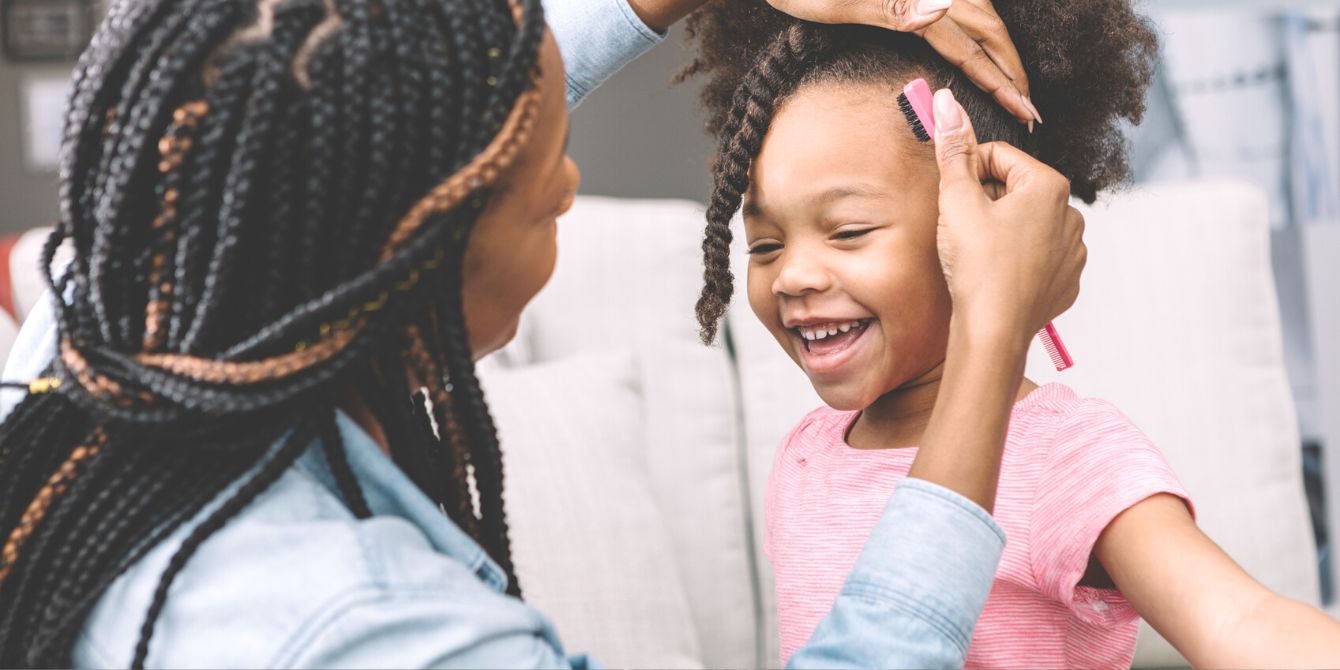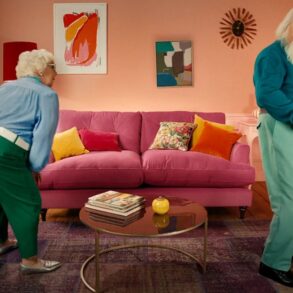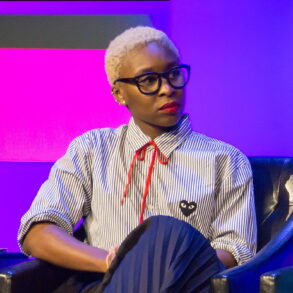
Black hair has always been thought of as “our crown,” says Ashly Benford, an educator and mom to two daughters, in response to this viral video of a sweet dad accidentally interrupting his daughter trying to film a GRWM of her doing her hair.
In the video, his daughter was very clearly frustrated and couldn’t get her hair quite right. Her sweet dad (with the most soothing voice ever) came in behind her and waved sweetly, apologizing for interrupting her video. She then said to him, “My hairline looks weird, right?”
He came over to her and caressed her head. “Stop touching it, because it could poof!” the daughter exclaimed as her dad rubbed her scalp and hairline, smoothing her hair back. What ensues is more than a bonding moment between a father and daughter – it’s a reflection of the deep cultural meaning of hair for Black Americans.
The seemingly simple act of a father helping his daughter with her hair scratches beneath the surface at why Black women have embraced their hair as a totem of confidence and culture as a response to their shared heritage.
“In the 19th and 20th century, our hair was used to weaponize our beauty and indicate our status. However, if you trace the history of Black hair prior to the Trans-Atlantic slave trade, you’ll discover the ways in which Black hair was celebrated and revered,” Benford tells Motherly.
In the video, the young girl’s dad told her that her hairline looked fine, and she needs to just fix it in the back. Then he said, “Gimmie,” to her hairbrush. As he was brushing through her hair, he told her, “Your mother thinks I’m not good at doing your hair, I’ll tell you what,” as he continued to gently brush.
“This is actually very soothing to me,” he said. “I need you to schedule a time when I can brush your hair on the regular.”
His daughter replied, “You can do it all the time, I never want to do my own hair.” Dad then told her he thought her hairline looked great, and that “she was trippin’.” The daughter said she didn’t know, and that it just looked weird. He responded she was just self-conscious about trying this new hairstyle.
“You need to be confident,” Dad told her. “You’re extremely beautiful, and no I’m not just saying that because I’m your Dad,” he said as his daughter teared up. As she placed her hands on top of his hands squeezing her shoulders, he said, “Real talk. I make pretty kids.”
Jamesa Hodge, a mom, school principal, and business owner says, “Our hair is an extension of our identity and how we choose to represent ourselves.”
“Our hair as Black girls and women, no matter how we wear it, represents our beauty, which is personal. Self-expression and confidence can come from it, but ultimately in the Black community, it represents femininity and liberation. Our hair is our crown!” Hodge tells Motherly.
Thankfully, the simple act of Black women being able to wear their hair naturally has become more “acceptable” in more recent years, but unfortunately, it hasn’t always been that way. The pressure to be “professional” looking, especially in the workplace, had many Black women treating their hair chemically for a straighter look, which many would argue, was a look that white women typically have.
“Recently, natural hair has become more celebrated, and many women have felt empowered to wear natural coils and curls,” Monae Davis, a mental health professional tells Motherly “Maintaining Black hair is a multibillion-dollar industry. From natural hair products, to sew-ins, weaves, braids, wigs, extensions, and dyes, to salons, stylists, relaxers, irons, dryers, curlers, pins, etc. People of color, if they do nothing else, they are expected to groom themselves accordingly,” she said.
“Since I was little, I was told how important it is to maintain my hair in a certain manner, lest I be seen as less than or unkempt,” Bendord said.
“My mother was raised in the midwest, and she went from rocking a large Afro in the 60s/70s, to donning a more ‘professional’ look (that required a relaxer) when she joined the corporate world,” she explained. “When I was little, my mom would plait my hair for school. If there was a special occasion, she would break out the hot comb to straighten my hair. When I went to middle school, that was the first time she relaxed my hair. I wore a relaxer until I was in my late 20s. Around that time, I finally became comfortable enough to wear my natural hair with the help of my stylist at the time.”
Davis has been rocking natural hair since 2008, but it wasn’t always easy. “I remember my own family members balking at me going natural and eventually getting locs,” she said. “My family called me a ‘pineapple head’ and said I wouldn’t attract any men. Again, the message I received at that time was that my [natural] hair was not desirable,” Davis said.
“Now, natural hair is the standard and relaxers are collecting dust on beauty supply store shelves,” she said.
Along with this touching video of a father helping his daughter style her hair, thankfully, there are even more viral videos showcasing the time and effort dads, and particularly dads of color, are giving to their daughters and styling their crowns. They’re all truly stepping up.
Another video worth noting is the Oscar-winning short film Hair Love by Matthew A. Cherry. This beautiful film centers around 7-year-old Zuri, and her unsuccessful attempts at styling her hair while using a hair tutorial video created by her mother, who is in the hospital with cancer. Her father tries to style her hair himself, and fails, but then they watch the video together and are able to create the style before going to visit her mom in the hospital.
For Hodge, the viral GRWM video of the dad and daughter was a special moment, because she said it isn’t common. “However, it is something that can be normalized and I think dads should feel empowered that they can do their daughter’s hair and have that connection with them,” she said.
“My mom (and most Black moms) fuss so much over how their daughters look, where it becomes annoying honestly,” Davis said. “I know it comes from a place of love, but I don’t need to hear ‘what’s going on with your hair?’ all the time. So to see a dad take the time to appreciate his daughter’s physical being and speak words of affirmation into her is a beautiful display of love that we don’t always see depicted,” she said.
“The dad was tender, affirming, and gentle. All demonstrations of vulnerability and emotional intelligence that are not always depicted with men, let alone Black men and Black fathers,” said Davis.
Alternately, Benford said her dad did her hair when she was little, “Not as well as my mom, of course,” she said. But her husband does both of her little girls’ hair when she’s not there. And she found the video to be a really sweet moment captured in time.
“I love how he affirmed her in the video—but I also think she was just having a moment like any other teenage girl. Teenagers have so much pressure to look a certain way (whether it is societally-based or just hormonal) and they can be really hard on themselves. In that moment, her dad was exactly who she needed him to be—loving, genuine, and uplifting.”
This post was originally published on this site be sure to check out more of their content.





